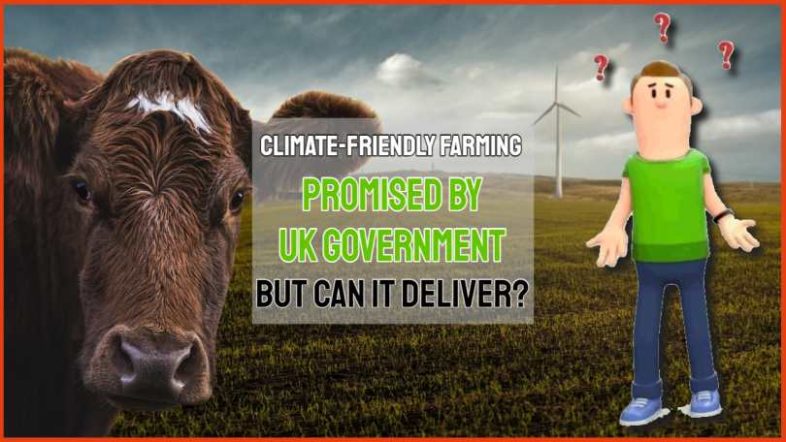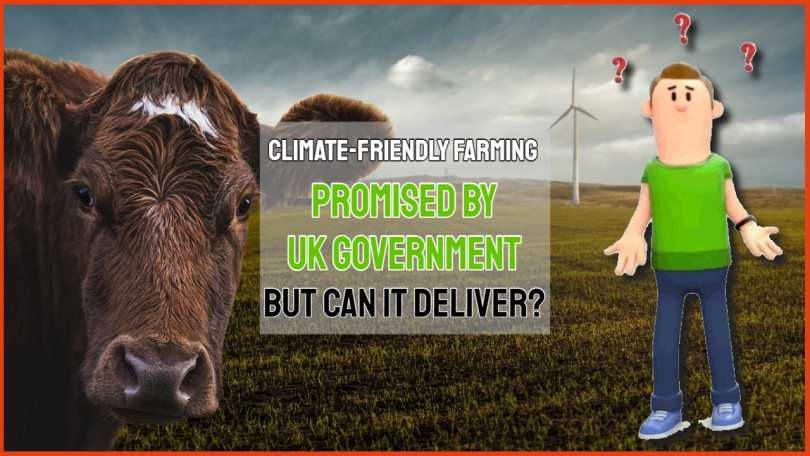At Eurobic11 we are all in favour of Climate-Friendly Farming the UK government's promises. For too long the UK has been forced to comply with the EU's Common Agricultural Policy (CAP) with a bias toward large farms and subsidies which have a perverse effect on nature.
With our interest in promoting the anaerobic digestion and biogas industry we also applaud the government's promises, so let them publish details and the democratic parliamentary process of the UK after Brexit begin.
For us, Climate-Friendly Farming will have to include the adoption of the anaerobic digestion process primarily for its role in improving farming sustainability through its ability to provide good waste management, and a renewable green fertiliser (digestate).
The Green Gas Support Scheme (GGSS) announced in December 2020 via a levy on Licensed Gas Suppliers is a good start, and we await further details.
Can the UK Government Deliver Climate Friendly Farming at Last?
As Ministers announce fresh details on the biggest shake-up in agricultural policy in 50 years, questions remain as to how effective promised subsidy reforms will prove
 The government has today set out its much-anticipated roadmap for delivering “the biggest change in agricultural policy in half a century”, as it seeks to gradually replace the EU's farming subsidy framework over the next seven years with a system that rewards farmers for enhancing the environment and protecting the climate.
The government has today set out its much-anticipated roadmap for delivering “the biggest change in agricultural policy in half a century”, as it seeks to gradually replace the EU's farming subsidy framework over the next seven years with a system that rewards farmers for enhancing the environment and protecting the climate.
The Agricultural Transition Plan, released today, sets out a pathway for weaning farmers in England off subsidies received through the EU's Common Agricultural Policy (CAP), which is set to come to an end in the UK when the Brexit transition period finishes on 31 December.
The CAP is widely regarded as having been detrimental to nature and climate protection, with its system of paying farmers a total of £1.64bn in subsidies based primarily on how much land they farm routinely accused of favouring industrialised farming practices and providing landowners with little incentive to embrace more sustainable approaches.
In the wake of the Brexit vote the government saw an opportunity to replace the CAP with a new subsidy regime that would pay landowners in return for the public goods they provided in the form of clean soil, air, and water, wildlife habitats, and climate resilience. Dubbed the Environmental Land Management (ELM) scheme, the new approach aims to ensure farmers in England are incentivised to embrace more sustainable practices, boost carbon sinks, and enhance nature.
Today's roadmap sets out plans for a gradual transition from the CAP to the ELM between now and 2028, by which point the government wants no farms in England to rely largely on public subsidy, instead surviving on income from food production, alongside public funding in return for the nature and climate protection efforts they undertake.
Direct Payments from the CAP and existing subsidy schemes will start to be phased out from next year, with the level halving by 2024, before final payments to farmers are made in 2027, Defra said. Meanwhile, the ELM will ramp up from a three-year pilot involving 5,500 farmers beginning 2021 to full national rollout by 2028.
Under the plans, the ELM will consist of three core components – sustainable farming, local nature recovery, and landscape recovery – with farmers able to access public funding for delivering services such as improving soil health, enhancing natural flood management, restoring habitats and woodland, and peatland creation.
Farmers and land managers will be able to assess which component of ELM is best-suited to their land, with work to finalise details of the new scheme to be undertaken over the coming years in collaboration and consultation with farmers, according to Defra.
In addition, the government said it plans to launch a new Farming Investment Fund for applications next year, aimed at providing targeted support for farming firms to invest in equipment, technology, and infrastructure that can improve productivity and deliver environmental benefits.
 Environment Secretary George Eustice said overhauling the way in which land in England is farmed and managed was critical to reversing devastating declines in nature and biodiversity, as well as meeting the UK's 2050 net-zero emissions target and combatting climate change, which he described as “one of the most urgent challenges facing the world”.
Environment Secretary George Eustice said overhauling the way in which land in England is farmed and managed was critical to reversing devastating declines in nature and biodiversity, as well as meeting the UK's 2050 net-zero emissions target and combatting climate change, which he described as “one of the most urgent challenges facing the world”.
“So as we take control of our agricultural policy, we can deliver the pace of change on land management for environmental benefits that the EU has never managed to achieve,” he added. “Our farmers and land managers will play a crucial role in the national effort to reach net-zero and our policies will help them do that.”
Much of the UK's wildlife-rich habitat has been lost and many species are in long-term decline, he said, arguing that “we cannot deny that the intensification of agriculture and the bureaucratic CAP have taken their toll on wildlife” and that “it makes no sense to subsidise land ownership”.
“We want farmers to access public money to help their businesses become more productive and sustainable, whilst taking steps to improve the environment and animal welfare, and deliver climate change outcomes on the land they manage,” Eustice continued. “Rather than the prescriptive, top-down rules of the EU era, we want to support the choices that farmers and land managers take. If we work together to get this right, then a decade from now the rest of the world will want to follow our lead.”
Statutory instruments are expected to be laid in Parliament as early as this week in order to enable the transition towards the ELM scheme, with the government promising to cut “unnecessary red tape” for farmers and place a greater emphasis on warning letters rather than fines as a means of driving compliance.
The move, which forms part of the Agriculture Bill, is a major pillar of the government's post-Brexit environmental legislation alongside the Environment and Fisheries bills and is aimed at setting out domestic governance structures for the UK's green rules and regulations once the country fully leaves the auspices of the EU. However, significant concerns remain among green groups and businesses about the effectiveness of the reforms, with many details far from being finalised with only weeks to go until the Brexit transition formally period ends.
And while moves to shift towards a system that rewards farmers for carrying out ‘public goods' services that benefit the environment have long been seen by climate campaigners as broadly positive, there remains widespread concern over the lack of detail over the ELM's implementation even following today's update.
Craig Bennett, chief executive of the Wildlife Trusts, said he was “deeply worried” that the pilot schemes “simply cannot deliver the promise that nature will be in a better state”, with the CAP replacement being brought in too slowly and without enough support for farmers who want to invest in environmental improvements and begin climate-friendly farming.
“Four years on from the EU referendum, we still lack the detail and clarity on how farm-funding will benefit the public,” he said. “This is desperately needed so farm businesses can plan and, just as vitally, so that nature's recovery can be planned alongside their work.”
“We urge the government to move faster to reverse nature's decline,” he added.
The National Farmers Union (NFU), meanwhile, warned that under the government's plans livestock farmers are set to lose between 60 per cent and 80 per cent of their income by 2024, and that the ELM would not be sufficient as it stands to provide a viable income for these businesses.
With the Brexit transition period coming to an end in weeks and an EU trade deal not yet finalised, NFU president Minette Batters said farmers still faced huge uncertainty, with many questions that Defra “needs to answer urgently”.
“Expecting farmers to run viable, high-cost farm businesses, continue to produce food and increase their environmental delivery, while phasing out existing support and without a complete replacement scheme for almost three years is high risk and a very big ask,” she warned.
With the potential of a no-deal Brexit still very much on the table – which the NFU and others have long warned would be devastating for farmers and environmental protection – the Green Party's Baroness Bennett slammed today's plan as a “betrayal of our farmers and the rural communities they are at the heart of”.
Moreover, she urged the government to support farmers in responding to changing consumer tastes as they shift towards more plant-based diets for health and environmental reasons as demanded by climate-friendly farming.
“Coming together with the pressure on exports from post-Brexit tariffs this will be a body-blow to an industry that is of vital importance to our very survival,” she added. “This plan for a leisurely process of trials and gradual implementation over a decade is grossly negligent against the backdrop of nature and climate emergencies.”
Meanwhile, green groups continue to harbour concerns that the reforms will flatter to deceive and could replace a system where payments are predominantly made based on land ownership to one where significant subsidies are paid out in return to negligible improvements in farming practices.
The government itself views the changes it has set out today as the biggest change in agricultural policy in over half a century, and as such argues that the planning that underpins such a major overhaul requires considered thought and extensive testing. Yet more than four years since the EU referendum, and amidst the huge economic uncertainty triggered by Brexit and Covid-19, many details are still to be fleshed out, leaving farmers under immense pressure to transform their practices over the coming years but still lacking a clear view of how they will be impacted by the sweeping reforms.
The environmental and climate benefits from much-needed reforms to farming subsidies could be hugely significant, but compounded with dietary changes, tightening green regulations, and a shifting UK trading landscape, British farmers are set for an eventful and disruptive few years.
Read more: businessgreen.com





